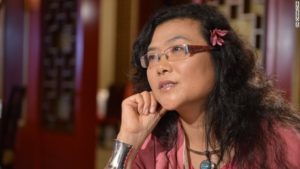
Former president Jiang Zemin was not only known for his relaxed way of dealing with foreign leaders, he is also fondly remembered by many of the Chinese who met him, recalls author and journalist Zhang Lijia at China File. “Now he is gone. Amid economic downturn and political repression, the Chinese public are remembering his positive side, his warmth and color, and his many talents, such as singing. Nostalgia, like old wine, tastes better as time goes by,” Zhang Lijia writes.
Zhang Lijia
In February 1998, then Chinese leader Jiang Zemin and his wife visited my hometown of Nanjing during the Lantern Festival, which marked the end of the Chinese New Year. My sister, an official in charge of the Confucian Temple where the festival was held, got to meet Jiang.
“He was so easygoing as he happily went along with all the arrangements, even though he held the lofty position of leader of the whole nation. A benevolent leader!” she gushed to me in a telephone interview after Jiang died. Jiang shook hands and cracked jokes with everyone present. When they passed the former residence of Li Xiangjun, a well-known beauty of the early 17th century, he began to talk about the opera The Peach Blossom Fan, inspired by her story. A huge fan of opera, he started to sing a few lines, winning enthusiastic applause. “I was deeply impressed,” my sister said. “He was a man of knowledge, charm, and sophistication.”
Then she added: “If we still had him as our leader, or someone enlightened like him, then we probably wouldn’t have to endure the excessive lockdown measures.”
This kind of nostalgia is very common right now. Many Chinese citizens have left messages on social media, remembering Jiang fondly, or posted videos of memorable moments, such as Jiang conducting a choir singing “Graduation Song,” a popular patriotic tune. There is an implicit contrast with greyer figures (or leaders?) like Xi Jinping. People can’t help but compare the former leader with Xi, who is behind the increasingly unpopular zero-COVID policy, and who is seen as authoritarian and power-thirsty.
Jiang served as China’s leader from 1989 to 2002. During his reign, he stabilized the country, repaired the damage caused by the brutal crackdown on the pro-democracy movement, and sought a warmer relationship with the West, especially the United States. It was a period of economic growth, which paved the way for China’s rise on the world stage. It was also a period of relative tolerance.
But it was not all a bed of roses. In the 1990s, to increase the efficiency of state-owned enterprises, economic reform measures were introduced which resulted in some 60 million urban workers being laid off. Many of my former colleagues at the rocket factory I had worked for lost their jobs. There was an undercurrent of resentment towards Jiang.
Now he is gone. Amid economic downturn and political repression, the Chinese public are remembering his positive side, his warmth and color, and his many talents, such as singing. Nostalgia, like old wine, tastes better as time goes by.
As they think of the past, many Chinese worry about their future. Ms. Yan, an old friend from Nanjing, is concerned that China will become isolated in the world and the yuan will devalue, eating up her modest savings. “Why can’t we have a sensible leader like Jiang?” she lamented. “When will we be able to choose our own leader?”
More stories about Jiang Zemin at China File.
Zhang Lijia is a speaker at the China Speakers Bureau. Do you need her at your (online) meeting or conference? Do get in touch or fill in our speakers’ request form.
Are you looking for more experts on cultural change at the China Speakers Bureau? Check out this list.
No comments:
Post a Comment